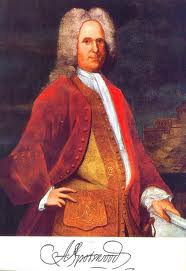Welcome

Insights into Alexander Spotswood must be gleaned from a variety of sources as there is surprisingly little academic work on an individual who contributed so much to the growth of colonial Virginia. Spotswood came to know Virginians well. In their superb book, The Stamp Act Crisis, Prologue to Revolution, Edmund S. Morgan and Helen M. Morgan find Alexander Spotswood to be almost prophetic in his understanding of colonial Virginians. Their book is a superb account of the events surrounding the Stamp Act and merits reading by anyone with even a modest interest in the history of America. Here we will quote from the early pages in the book as the authors look back, before the Stamp Act, to find the roots of the forces which shaped America:
The place was something out of a fairy tale, a ghost town in the wilderness, empty houses lining the street on one side, savage plants creeping toward to recover their domain, and on the other side – an enchanted castle, where a gentleman lived with his wife and her young sister. They might have been king, queen and princess, and the two tame deer which wondered about the house were doubtless a lord and lady transformed by some magic into their present shape. There was a rich meadow, surrounded on three sides by a winding river, and shady lanes which led past a marble fountain, and a covered bower where the princess sat and bewailed the suitor who did not come.
This was Germanna, on the Rapidan River in Spotsylvania; the king was Colonel Alexander Spotswood, former Governor of Virginia, and the queen was his wife whom he had brought to London to live in this improbable paradise. The empty houses had once been the homes of the German settlers whom Spotswood had planted there but who had since deserted him. . . . .
William Byrd had come to consult with the Colonel about iron-mining, but he had a gift for recording scenes and conversations, and in his journal he snatched the whole episode out of time and left it to us, complete with Spotswood's oracular pronouncements not only on iron-mining, but also on tar-burning, hemp, the Spaniards, the post office, and British politics. In this fantastic setting, so far from the civilized world, . . . . .
Spotswood spoke of events in London or Boston as though he could abolish at will the desert of woods and water that separated them from him. He told Byrd how the British government had demanded that the people of Massachusetts settle a standing salary upon the governor whom the King appointed for them. The New Englanders had refused, and now, said Spotswood, the Ministry were receding from that demand. “He said further,” Byrd recorded, “that if the Assembly in New England would stand Bluff, he did not see how they cou'd be forct to raise money against their Will, for if they shou'd direct it to be done by Act of Parliament, which they have threatenen'd to do, (though it be against the Right of Englishmen to be taxt, but by their Representatives), yet they wou'd find it no easy matter to put such an Act in execution.”
. . . . Spotswood's prophecy need not be ascribed to second sight, for he had been Governor of Virginia, and he knew from bitter experience how jealously a colonial assembly guarded its right to levy taxes. In 1715 the House of Burgesses had refused to grant the supplies necessary for defense against the Indians, because they thought that he had called some of their prerogatives in question. He had denounced them and finally dissolved them, but he had not beaten them. And he knew that any attempt to by Parliament to beat them would have met with doubled resistance.
This excerpt from the above described book opens a window of historical perspective as to just one component of the fascinating life and important contributions of one of the great characters of English and American history. Enjoy exploring with us as we look back at the life and times of Alexander Spotswood.
 Join us on Facebook to discuss Alexander Spotswood and the history surrounding him.
Join us on Facebook to discuss Alexander Spotswood and the history surrounding him.
